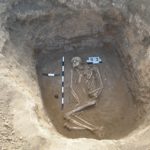 In the previous part of the episode, we learned how linguists were able to reconstruct bits of the ancient & long lost Indo-European language. In this episode, we’ll discover what can these words tell us about life in the Bronze Age, family ties, and nomadic relationships. We’ll also learn about the links between Genetics & Linguistics: a recent genetic finding that explains the unprecedented success of that language: a single lucky mutation that enabled the Yamna People, as they are called today, to digest milk.
In the previous part of the episode, we learned how linguists were able to reconstruct bits of the ancient & long lost Indo-European language. In this episode, we’ll discover what can these words tell us about life in the Bronze Age, family ties, and nomadic relationships. We’ll also learn about the links between Genetics & Linguistics: a recent genetic finding that explains the unprecedented success of that language: a single lucky mutation that enabled the Yamna People, as they are called today, to digest milk.
Link To The Indo-European Language, Pt. 1
Download mp3 | Read Transcript
Subscribe: iTunes | Android App | RSS link | Facebook | Twitter
- A big Thank You to Kevin Stroud, from The History of English podcast – for his help with research and appearing in the episode.
- Check out The Surface Smiths Podcast, a show about the Microsoft Surface and related technologies such as Windows, Xbox, etc.
- Help us climb the charts! write a review on iTunes.

Credits
Ancient Cavern II By Carlos Carty
Tribal By t-hinkwear
Tribal By Alex Shavez
when expanding into asia minor. turkey not hunter-gather developed culture from 60oo bce. frescoes, fabrics produced in three descrete techniques. Should be words in absolute basics. More basic than sheep or oxen. should be felt which preceded domestic shheep. gathered from wild. leather. skin/pelt, fur, cordage/string/rope. technology with evidence from 92,000 here in the southern levant and obviously much older. sinew one of the most basic elements before sewing or weaving. knot know from 92000 and net derived from this tree bast and wild fibres e g nettle. nice will listen once the link rights itself and the one on genetic dispersion. yashar koach janet levy. see if you come up with a basic word for water/river conected to our yarmuk/yarkon etc bye janet levy
Hi Ran,
Quick Q about the Indo-European Language, Pt. 2: you mention from 4500 BC until 2500 BC, therefore a span of … 7000 years. Unless I did not get it right but surely you mean a span of 2000 years. If I did hear it correctly I am suspecting you did put in this ‘mistake’ on purpose to see who is reacting :-).
Or did I get it wrong??
Frank
Did I say 4500BC? it should have been 8500BC and 6000 years (If I remember correctly the article about the particular research).
Thanks for the correction, Frank! And no, I didn’t do it on purpose – although now that you gave me the idea… 😉
Ran